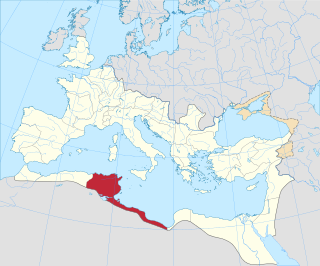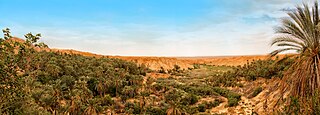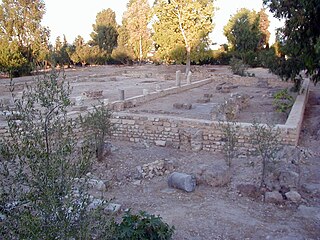Related Research Articles

Saint Optatus, sometimes anglicized as St. Optate, was Bishop of Milevis, in Numidia, in the fourth century, remembered for his writings against Donatism.

Uppenna or Upenna is a Tunisian archaeological site located on the site of the present locality of Henchir Chigarnia. The site has delivered a basilica and the remains of a fortress.

Abitinae was a town in the Roman province of Africa Proconsularis and is famed for the Martyrs of Abitinae.

Pierre Batiffol – was a French Catholic priest and prominent theologian, specialising in Church history. He had also a particular interest in the history of dogma.

Negrine is a town and commune in Tébessa Province in north-eastern Algeria. It was the site of ancient Casae Nigrae, a settlement of Roman North Africa with an attached bishopric that remains a Latin Catholic titular see.

Cartennae or Cartenna was an ancient, Carthaginian, and Roman port at present-day Ténès, Algeria. Under the Romans, it was part of the province of Mauretania Caesariensis.

The Archdiocese of Carthage, also known as the Church of Carthage, was a Latin Catholic diocese established in Carthage, Roman Empire, in the 2nd century. Agrippin was the first named bishop, around 230 AD. The temporal importance of the city of Carthage in the Roman Empire had previously been restored by Julius Caesar and Augustus. When Christianity became firmly established around the Roman province of Africa Proconsulare, Carthage became its natural ecclesiastical seat. Carthage subsequently exercised informal primacy as an archdiocese, being the most important center of Christianity in the whole of Roman Africa, corresponding to most of today's Mediterranean coast and inland of Northern Africa. As such, it enjoyed honorary title of patriarch as well as primate of Africa: Pope Leo I confirmed the primacy of the bishop of Carthage in 446: "Indeed, after the Roman Bishop, the leading Bishop and metropolitan for all Africa is the Bishop of Carthage."
Secundus of Tigisis was an early church leader and primate of Numidia. He was a leading organiser of the early Donatist movement in Carthage.
Zattara was an ancient Roman and Byzantine town in the Africa province. It was located in present-day Kef ben-Zioune, south-east of Calama, Algeria. The city was a titular see of the Roman Catholic Church.
Rotaria was an ancient Roman and Byzantine era bishopric of Numidia, North Africa.

Aptuca (Africa) or Henchir Oudeka, also known as Aptucca/Aptuca, Henchir-Oudeka/Henchir-Semmech. or Udeka is a village and archaeological site in Tunisia, North Africa located at 36.409344, 8.940301.

Majorinus was the leader of a schismatic Christian sect in Roman North Africa known as the Donatists.
Claude Lepelley was a 20th-21st-century French historian, a specialist of late Antiquity and North Africa during Antiquity. His thesis, Les cités de l'Afrique romaine au Bas-Empire, defended in 1977 under the direction of William Seston, profoundly changed the understanding of the urban world in the 3rd and 4th centuries; far from declining, the cities of Africa had some prosperity.

Purpurius was a Donatist bishop from 305 to 320 AD, who was instrumental in establishing the Donatist movement of Roman North Africa.
Primian (Primianus) was an early Christian Bishop of Carthage, and leader of the Donatist movement in Roman North Africa. Seen as a moderate by some in his faction, he was a controversial figure in a time of fragmentation of the Donatists, a reactionary branch of Christianity.

Sitipa also known as Sitipensis is a titular see of the Roman Catholic Church centered in North Africa.
Cediae (Cediæ) was an ancient city and former bishopric in Roman North Africa. It is now a Latin Catholic titular see.

Marazanae was a Roman town of the Roman province of Byzacena during the Roman Empire and into late antiquity.
Anne-Marie La Bonnardière (1906-1998) was a scholar of St Augustine, known for her work on the influence of the bible on St Augustine's writing.
Yvette Duval was a Moroccan-born French historian who specialised in North Africa during Antiquity and the Early African church during Late antiquity.
References
Citations
- ↑ Catholic Encyclopedia - Donatists
- ↑ Milman, H.H.: "The History of Christianity", page 367. John Murray 1840
- ↑ Emilien Lamirande, La correspondence entre Secundus et Mensurius, in: Œuvres de Saint Augustin 32 (Bibliothèque Augustinienne) 1965, p728.
- ↑ Timothy David Barnes, Constantine and Eusebius (Harvard University Press, 1981)p55.
Sources
- Christian Encyclopedia - Lutheran Missouri Synod - Mensurius
- Anette Hettinger (1993). "Mensurius, katholischer Bischof von Karthago". In Bautz, Traugott (ed.). Biographisch-Bibliographisches Kirchenlexikon (BBKL) (in German). Vol. 5. Herzberg: Bautz. cols. 1272–1273. ISBN 3-88309-043-3.
- Augustinus, Breuiculus conlationis cum Donatistis III, 13, 25 u. 17, 32, in: CChr 149A, 290-298
- D. Voelter, Der Ursprung des Donatismus nach den Quellen untersucht und dargestellt, 1883
- Louis Duchesne, Le dossier du Donatisme, in: Mélanges d'archéologie et d'histoire 10, 1890, 628 f.
- Paul Monceaux, Histoire littéraire de l'Afrique chrétienne depuis les origines jusqu'à l'invasion arabe (7 volumes : Tertullien et les origines - saint Cyprien et son temps - le IV, d'Arnobe à Victorin - le Donatisme - saint Optat et les premiers écrivains donatistes - la littérature donatiste au temps de saint Augustin - saint Augustin et le donatisme) (19662) 8-25, 204
- Hans von Soden (Hrsg.), Urkunden zur Entstehungsgeschichte des Donatismus, 1913 (bearb. v. H.v. Campenhausen 19502), Nr. 4, 5-7
- W. H. C. Frend, The Donatist Church, 1952 (19853), 6-17
- K. Clancy, When did the Donatist Schism Begin?, in: JThS 28, 1977, 104-109
- Emilien Lamirande, La correspondence entre Secundus et Mensurius, in: Œuvres de Saint Augustin 32 (Bibliothèque Augustinienne) 1965, 728
- M. Nallino, Un papiro cristiano della raccolta fiorentina. Lettera di Theonas a Mensurio, in: Atene e Roma 11, 1966, 27-30
- Jean-Louis Maier, L'épiscopat de l'Afrique romaine, vandale et Byzantine (Bibliotheca Helvetica Romana 11), 1973, 363–364; - ders., Le dossier du donatisme I : Des origines à la mort de Constance II, 303-361 (Texte und Untersuchungen zur Geschichte der altchristlichen Literatur 134), 1987, Index
- T.D. Barnes, The Beginnings of Donatism, in: JThS NS 26, 1975, 13-22
- Serge Lancel, Les débuts du Donatisme: La date du "Protocole de Cirta" et de l'élection épiscopale de Silvanus, in: RevÉAug 25, 1979, 217-229
- André Mandouze, Prosopographie de l'Afrique chrétienne 303-533 (Prosopographie chrétienne du Bas-Empire 1), 1982, 748-749
- Bernhard Kriegbaum, Kirche der Traditoren oder Kirche der Märtyrer. Die Vorgeschichte des Donatismus (Innsbrucker Theologische Studien 16), 1986, 59-148
- Pauly-Wissowa XV/1, 960–961; - RGG3 IV, 877; - TRE I, 653–655.